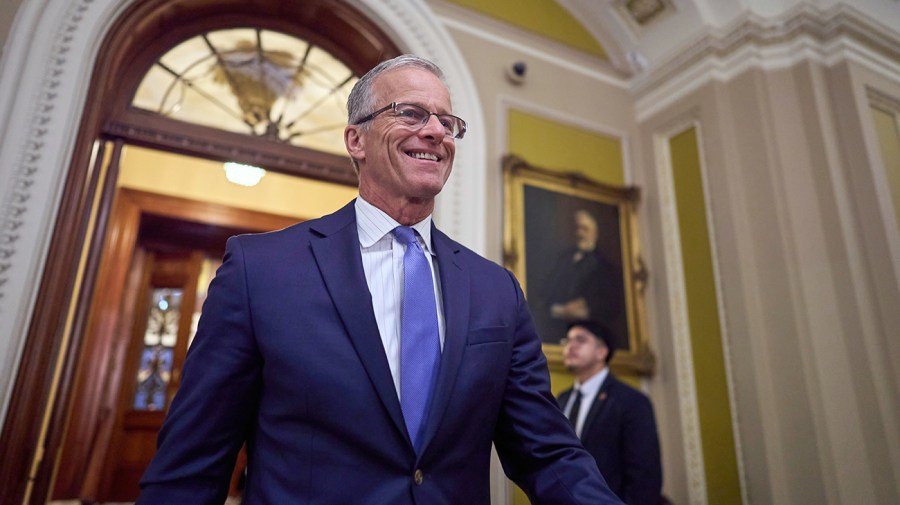
Senate Majority Leader John Thune (R-S.D.) is sticking to his ambitious schedule of getting the Republican megabill to President Trump’s desk by July 4, even as he faces objections from Senate GOP colleagues and the Senate parliamentarian to key provisions in the bill.
Republican senators are racing to work out their disagreements over Medicaid, renewable energy tax breaks and other provisions before the bill comes to the Senate floor on Thursday or Friday.
Medicaid is looming as an intractable issue for Thune as several Republican senators said Monday evening that they still have concerns about cuts to the program.
“I still have concerns about a few provisions in the bill. I’m not satisfied yet,” said Sen. Jerry Moran (R-Kan.).
Sen. Thom Tillis (R-N.C.) said the Medicaid provisions in the bill need “work.”
“I think it could get done over the course of a few days but probably not by Thursday,” he said.
They also need to reach a deal with Republicans from New York, New Jersey and California who are threatening to scuttle the bill in the House if it doesn’t substantially raise the cap on state and local tax (SALT) deductions.
Thune told reporters Monday the plan is to move “full speed ahead” and vowed to keep the Senate in session through the scheduled July 4 recess to meet Trump’s deadline.
“We’re on schedule,” he said.
Asked if he has the votes to pass the legislation, Thune replied: “Let’s hope so.”
The GOP leader vowed on social media that senators “will remain here” in Washington “until this reconciliation bill is passed.”
“By placing it on President Trump’s desk by the 4th of July, we will be ensuring that future generations of Americans can live in safety and prosperity,” he posted on the social platform X.
Despite their multiple disagreements, Senate Republicans would be glad to get the sprawling legislation through the chamber quickly to get it out of the political spotlight.
The longer they take, the more time Democrats have to take shots at it. They’re accusing their Republican colleagues of cutting vital federal programs to offset the cost of cutting taxes for wealthy individuals and corporations.
A Fox News poll of 1,003 registered voters nationwide found that only 38 percent of respondents favored the legislation while 59 percent opposed it.
Senate conservatives including Sens. Ron Johnson (Wis.), Mike Lee (Utah) and Rick Scott (Fla.) are pressuring Thune to agree to deeper spending cuts in the bill, with Johnson being the most outspoken in threatening to vote against it.
Johnson told constituents during a conference call Monday that he is highly skeptical the bill can get done this week and that he was scheduled to meet with Trump at the White House to discuss his misgivings.
Senate Republicans control 53 seats and can afford only three defections and still pass the bill.
Sen. Rand Paul (R-Ky.) is a hard “no” over language raising the federal debt ceiling by $5 trillion to give the government enough borrowing authority to get past the 2026 election.
The other major obstacle Thune faces is getting the bill reviewed and approved by the Senate parliamentarian in the face of a barrage of procedural objections from Senate Democrats.
Thune acknowledged that the parliamentarian’s review is limiting how quickly Republicans can move.
“The Byrd process … is something we have to go through. It’s a feature we don’t have complete control over but they’re working through it,” he said.
Provisions of the bill that fail to pass the Byrd Rule are not eligible for passage under Senate budget rules that allow a simple-majority vote on reconciliation language.
Thune acknowledged Republicans have failed to advance some provisions of the bill past the parliamentary review but added that they’re reworking the provisions.
“In some cases, as things are flagged, we’re making counteroffers,” he said.
Democrats have already gotten the parliamentarian to reject an array of provisions, including language that would have shifted a significant portion of the cost of the Supplemental Nutrition Assistance Program (SNAP) onto states.
GOP leaders had hoped to pay for a chunk of their tax package by cutting federal SNAP funding, but the parliamentarian ruled that the measure violated the Byrd Rule and would not be eligible to pass with a simple-majority vote.
The parliamentarian also rejected language that would have severely restricted federal courts’ ability to use their contempt power to enforce injunctions and other rulings against Trump administration officials.
She also advised against language authorizing states to conduct border security and immigration enforcement, duties that traditionally have belonged entirely to the federal government.
But Republicans on Monday said the parliamentarian ruling against certain provisions doesn’t mean they can’t be rewritten to eventually pass procedural muster.
“We’re not just accepting what the parliamentarian says. There are going to be modifications made to try to accommodate her rulings,” said Sen. John Cornyn (R-Texas), a GOP leadership team adviser.
Thune is hoping to have a deal negotiated with House Republicans who want to lift the SALT cap before the bill comes up for a final vote.
He has tapped Sen. Markwayne Mullin (R-Okla.) to help broker an agreement so that whatever passes the Senate can get majority support in the House.
Sen. James Lankford (R-Okla.) said it’s a complicated issue that still needs to be resolved.
“It’s one we got to be able to solve,” he said.
Republicans also have to wait to get a final score from the Congressional Budget Office (CBO) on the total cost of the bill and a projection from the agency on how changes to Medicaid work requirements, eligibility and health care provider taxes are likely to impact the number of Americans covered by the program.
Thune and Republicans concerned about Medicaid spending cuts, including Sens. Lisa Murkowski (Alaska), Susan Collins (Maine), Josh Hawley (Mo.) and Moran, are working on a deal to provide financial support for rural hospitals that would otherwise be at risk of shuttering due to reduced federal spending.
Senate Republican Policy Committee Chair Shelley Moore Capito (W.Va.) said Monday that GOP leaders have proposed a plan to help rural hospitals.
“We need to see that,” she said.
But she said the bill is largely crafted at this point and unlikely to change much.
“I think it’s pretty baked right now,” she said.






